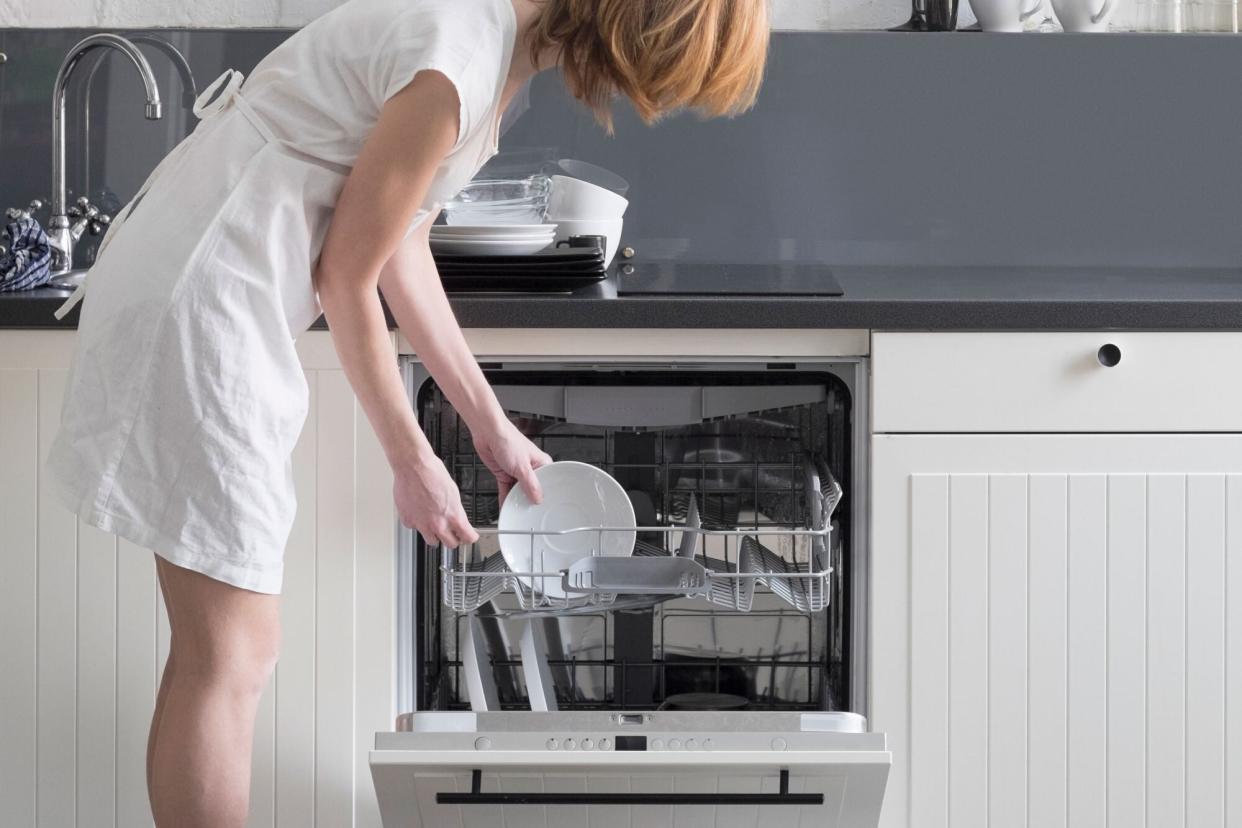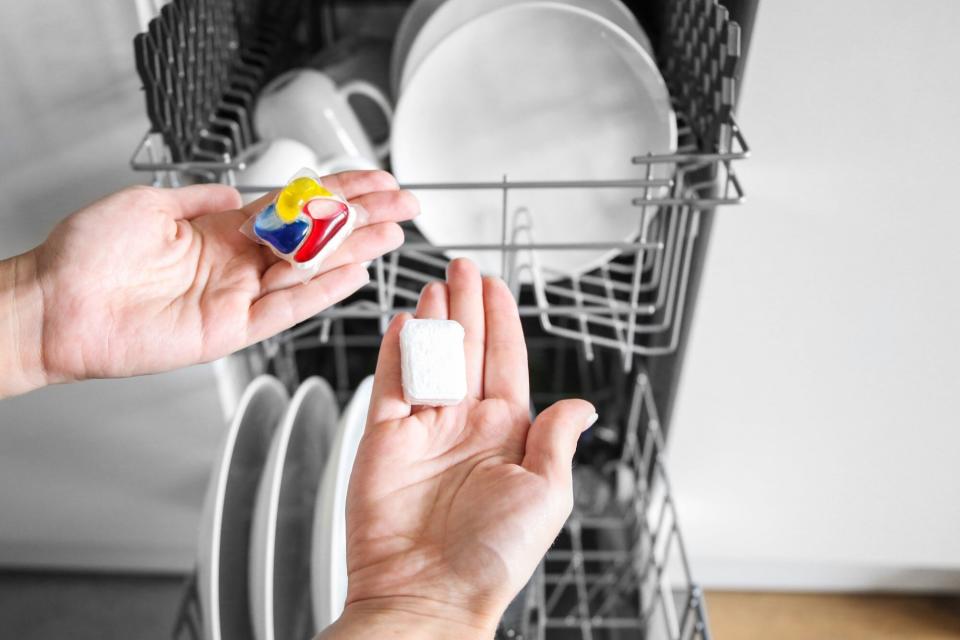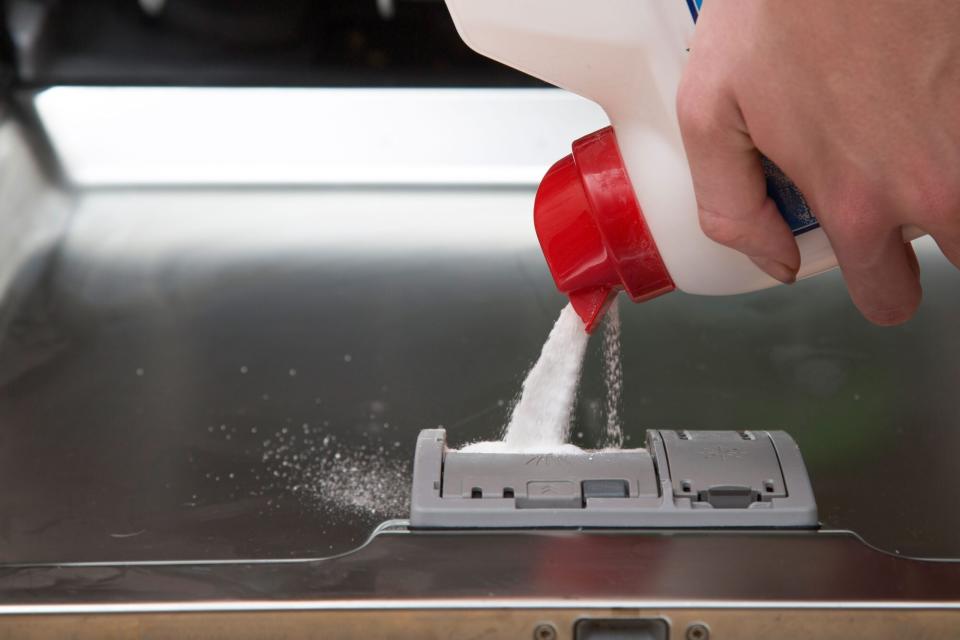Liquid, Tablet, or Powder: Which Dishwasher Detergent Cleans Best?

GETTY IMAGES
TABLE OF CONTENTS
On This Page
Dishwasher Detergents, Explained
The Detergents' Ingredients
When to Use Each Detergent
After cooking and enjoying a meal with loved ones, staring at the stack of pots and dishes in the sink at the end of the night can zap some of your joy. That's why we treasure our dishwashers: With the push of a button, you can easily get all of those dishes, wine glasses, and (some) pans clean again.
This process is even smoother if you use the right detergent, which most often comes in tablet, powder, or liquid form. But which one, exactly, is best? We tapped a few cleaning and appliance experts to explain more about these cleaner varieties—and to determine whether or not one trumps the rest.
Related: The Best Way to Load and Use Your Dishwasher
Dishwasher Detergents, Explained
On the market, you will find three different types of dishwasher detergents: tablets, powder, and liquid. Your choice will likely come down to budget, convenience, and your personal values, says Jessica Petrino, an educator and appliance expert at AJ Madison.

GETTY IMAGES
Tablets
If you're looking for a detergent that is both convenient and mess-free, tablets are a safe choice. These are pre-measured with cleansing ingredients, so you can easily add one to your dishwasher before starting the cycle without any spillage, says Vera Peterson, the president of Molly Maid, a Neighborly company. Tablets are also compact, which means there are less carbon emissions from their transportation, according to the Ethical Consumer Research Association.
Within the category, you will also find pods, which are commonly known as liquitabs. These are also compact, and are small enough to store under your sink or another secure area in your kitchen. While transporting these tiny detergent iterations cuts down on their carbon footprint, both tabs and liquitabs have a lot of packaging, which isn't ideal from an environmental perspective. They are also more expensive than other detergent options.

GETTY IMAGES
Powder
Some people prefer powder, as it is more sustainable and eco-friendly thanks to the recyclable cardboard packing it often comes in; it's also a more affordable buy. However, the Ethical Consumer Research Association notes that since powder is bulkier than tablets, there can be higher transportation emissions. Plus, it is easy to use (and therefore waste) too much of it, since it doesn't come pre-measured.

GETTY IMAGES
Liquid
You'll often find that liquid detergents are the most affordable option out of these three varieties, Peterson says. There are some environmental downsides: They are usually packaged in large, bulky plastic bottles, which can lead to more waste if they aren't recycled properly. These bottles are the heaviest option of all detergent forms since they are mostly water; this leads to higher transport emissions, per the Ethical Consumer Research Association, and reduced storage space in your cleaning closet.
The Detergents' Ingredients
Each detergent's components allow them to safely, effectively clean the toughest messes on your dishes. "When it comes to the active ingredients, most detergents use a combination of grease-cutting bleach, enzymes, oxi beach, and rinsing agent to keep dishes clean, clear, and polished," says Petrino.
Tablets
Tablets typically have two sections: one for the enzyme-based detergent and one for the bleach agent. Petrino prefers Miele's dual-tab cleaner detergent ("It's a favorite among our team members at AJ Madison with rave reviews online," she says) and, according to the company, the "powder and (dry)tabs also dissolve better in water and are easier to carry throughout the cycle." In some cases, tablets will have other ingredients, like a rinse aid or added enzymes.
Powder
Tablets and powder detergents are the most similar from an ingredient standpoint: "Powder and powder-based tab detergents are mostly made up of a bleach type agent and enzymes," says Petrino. She notes that bleach combats the stains and the enzymes break down proteins and solids.
Liquid
Liquid formulas, on the other hand, do not typically involve bleach. These cleaners are primarily filled with enzymes. "Bleach in a liquid form will essentially kill the enzymes when mixed (the same with laundry detergents)," says Petrino.
When to Use Each Detergent
Even though these detergents do have their differences, there isn't a clear winner. The only way to discover which one works best in your machine is to see how it reacts with your water, says Ron Shimek, the president of Mr. Appliance, a Neighborly company. "First, you need to test your water or [check] your city's report to see if it's hard or soft," he says. "Second, you need to [determine] the temperature of the water that goes into your dishwasher."
While some high-end dishwashers have water softeners, a reservoir where you can add dishwasher salts that neutralize water hardness, Petrino says that it's better to simply choose a detergent that works well with your water type and temperature. And always be sure to read the detergent's label for the brand's tips on how to achieve the most effective results.
Powder
Shimek explains that powdered detergents work best with hard water. Since these detergents do not dissolve well in cold water, he recommends only using this variety in hot temperatures.
Liquid
Liquid detergents work best with soft water. This variety is compatible with hot or cold water, explains Shimek.
Tablets
Tablets and pods come in powder, liquid, or hybrid form, depending on the brand—so you'll want to better understand your water before you choose an iteration. "Once you know if powder or liquid is best for you, you can think about which pod type [is better,]" says Shimek.

